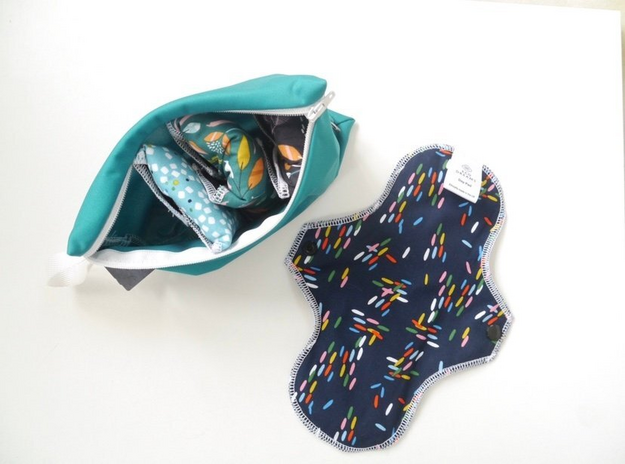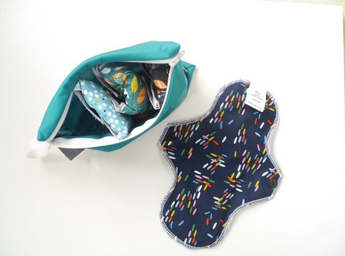The average woman menstruates for roughly forty years and uses more than 11,000 disposable products in her lifetime. The time it takes for a tampon to degrade is longer than the lifespan of the woman that wears it. Plastic and modern life comes hand and hand. We live in a world where convenience trumps all. The true cost of this convenience can be difficult to calculate. Period products are labelled as “medical waste”.
In a land where time is money, bodily functions are often seen as an inconvenience with period taboo contributing to an all-round sense of embarrassment that is simply not needed. Women around the world are now reverting back to more natural methods, determined to change the narrative of secrecy and waste. This is where moon cups and reusable pads come into play.
EcoDreams was a company founded in 2015 by two eighteen-year old twin sisters, providing reusable menstrual pads. The pair’s national advertising campaign in the UK was the first one to promote reusable period products. Director Justine Fontan explains that at the time, finding more sustainable products was an incredibly difficult task. Like many women, she had an allergic reaction to disposable pads leading her to search for alternative options. “At the time it was really hard to get organic pads and tampons.”
As Fontan researched this gap in the market further, the issue of period poverty (something that was far closer to home than she had originally thought) came to light. This made her realise the true importance of a modern, sustainable period products company. “I had to do it. I felt that this was too important not to do.”
Keeping the secret silent
Pads originally came to the market in 1921, developed from an absorbent material that had been used for bandages in World War 1. Quick thinking nurses soon came up with another use for the Cellucotton material. Since then, major corporations have strived to make products as discrete, lady-like and individually wrapped. A move towards almost silent wrappers further emphasised that a period was a private affair, a secret that 50% of the population had to keep hidden. Surplus packaging, applicators and paper scented with harsh chemicals was the perfect way to hide this so-called secret.
Single use pads are a relatively new concept that took a while for ordinary women to use every day. “It took a really long time for people to start using disposables because of the cost, the fact that they were really bulky and weren’t that great at the beginning”, explains Fontan.
Upon first impression, EcoDreams reusable pads are far more attractive than their single use counterparts. Colourful prints give a personal feel, a break from the monotony of millions of plastic pads that promise to remain silent. Its absorbent layer seems promising and the wings secured with a simple click seem trustworthy. It is estimated that these pads will roughly eight years with proper care, in comparison to the four-hour lifespan of disposables.

Period Taboo
A delivery of a reusable pad even in 2021 can still raise eyebrows. This should be no surprise in a country that banned an informative Tampax ad for being vulgar. Housemates are initially “grossed out” when they discover that these pads do not go straight into a sanitary ban after half an hour. A snapchat boasting the gorgeous recycled packaging and a kind note, is met with various replies. Some male friends express their discomfort and other female friends act as if you have faltered and confessed a state secret. Would a clothing haul from Shein create such controversy? Surely not.
These are the effects of a society that encourages us to become separate entities from our body. There is no time to be sluggish or feel off, when there are buses to catch and meetings to attend.
Parents and grandparents explain that the seemingly endless packaging was not always a given. Pads came in boxes, no need to be separately packaged.
Period taboo is still an issue in 2021, even in the reusable pad industry. Fontan says that friends have only stopped wondering what her ‘next’ project was. At organic, natural food exhibitions concerned citizens would be appalled by their stand. “We had a few women tell us that we shouldn’t be there”. Others were simply mortified at the fact that men might discover the existence of menstruation. “My husband is here”, being one of the concerns raised.
The results are well worth the scepticism. The pads are far more comfortable, mould perfectly with the shape of your body and give a sense of all round protection (even in the dreaded white trousers). The damp feeling that one feels after wearing a single use pad for ten minutes, was not an issue with this product.
A traditional design tweaked for modern times
The dreaded wash time does of course take time, which is why some women may prefer to use a mix of different period products. However, the quick drying time is ideal for a climate where hanging things on the line is usually not an option. Fontan’s product is not a new one, it’s simply a traditional one that has been tweaked to suit the modern busy woman (pads with anti-bacterial properties that are stain resistant). Embarking on the switch to more sustainable options can still seem daunting.
“It’s not a new product but we have tweaked the design… A lot of people think you’re going to have to compromise with reusable pads. That is not the case”
Encouraging women to use only reusable products alone can be a heavy task. The idea that every little bit helps is far more effective. It can be quite hard to revert to single use plastic products after being exposed to an alternative that doesn’t cause skin irritation.
Fontan explains that a growing number are giving reusable products a go. She explains to HerCampus that she has seen serious improvement within the reusable pad industry in the last years, making them more accessible now than ever.
“The market has shrunk. The disposable market is shrinking.

Menstrual cups
Using moon cups, means that you see what happens to your body every month- an experience that can be a little strange at first. When young girls first get their periods they are often taught how to dispose of products as silently and as discrete as possible. It can be strange to break this cycle, but rewarding.
Moon cups help women to reconnect with their own bodies. “We have been shamed into disassociating from our bodies”, says Fontan. “You have to touch your body, you have to get comfortable with it… You cannot ignore your body”.
We remove the process from conversation and dump the products in landfills. Scented pads further amplify the idea that this bodily function is in some way dirty. Television ads and beauty magazines enforce the importance of feminine hygiene products, wipes and washes.
Tampon and pad companies do not have to legally disclose the contents of their products. Fontan explains that the petitions for Proctor and Gamble (who own Tampax and Always) to disclose what’s in their products were unsuccessful. “They still haven’t. They don’t want to.”
The problem does not lie solely with the pads themselves. Other issues come into play when raw materials aren’t sourced locally. Although going down this route can work out far cheaper it was never an option for EcoDreams. “The packaging, the shipping, the electricity” all need to be considered when moving towards a brighter future.
That future may not necessarily mean that every single person switches over to reusable products but Fontan would like to see more organic disposable brands like Natracare become more accessible, stocked in local pharmacies and supermarkets.
She wants to expand their charity work even further and offer the educational tools to allow women to find the best fit for them.
“We are not a company that pushes our product as the only way you should go… It’s your body. It’s your choice. There are plenty of alternatives out there and it is important that you are empowered.”
Her Campus DCU were kindly gifted reusable pads from Eco Dreams



